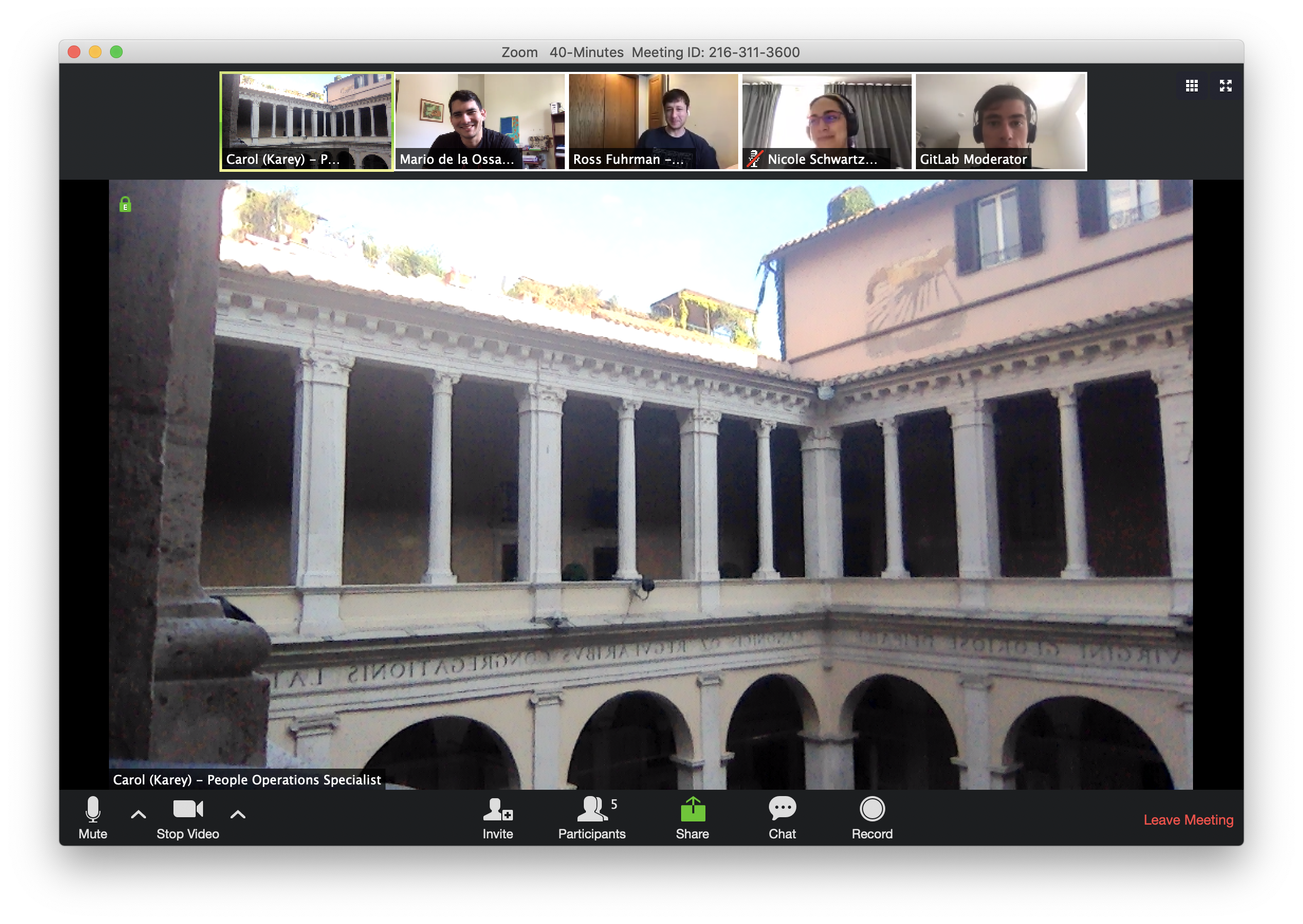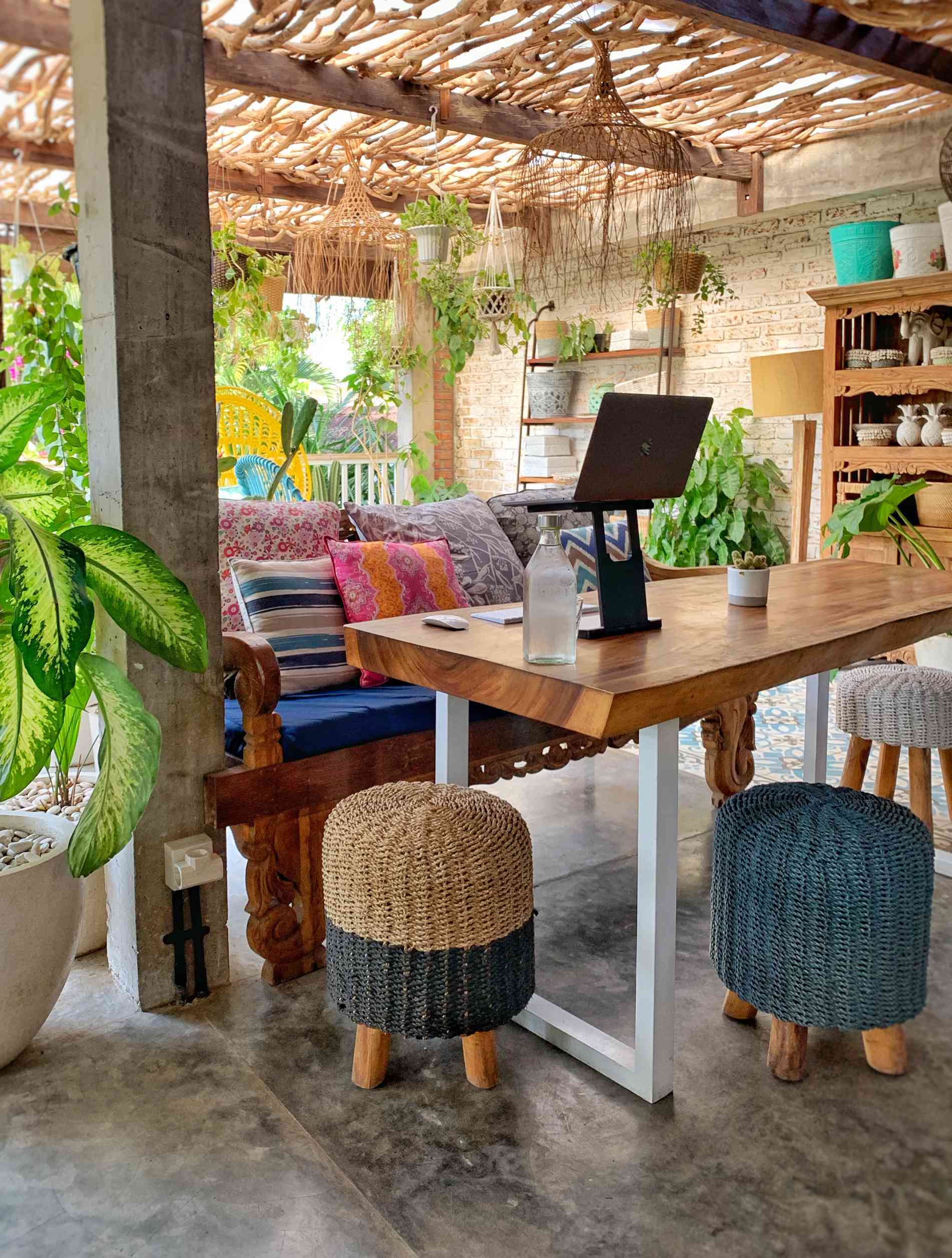Published on: September 23, 2019
9 min read
How to push code from a hammock
Our remote work dream team balances globetrotting with career advancement at GitLab.

At GitLab, our team doesn’t wake up at the same time and commute the same routes to sit in the same office. In fact, some of our team members don’t have an office at all! As a globally distributed company with an all-remote workforce, we have an exceptionally diverse set of team members dispersed on multiple continents. In this series, we explore how GitLab team members use the autonomy our company affords them to create workspaces that suit their lifestyle and cater to their hierarchy of needs: Whether that involves creating a cozy home office space, or diving into the unknown by working while traveling. New here? Go back to read part one of our remote work series.
For many career-minded individuals, the desire to travel for prolonged periods comes at a cost. Sometimes, the only options are to plan for rushed two-week bursts of vacation, wait for retirement, or leave your career behind.
Back in 2013, I had the opportunity to volunteer at an NGO in Hanoi for a month, but in order to do so, I had to make a choice: Leave my job as a reporter, or pass on the opportunity to work in Vietnam. My reporting job only allotted employees two weeks of annual paid time off (PTO) and didn’t allow for remote work at all. After some (but not much) deliberation, I left my job and went to Hanoi.
Even in some companies where working remotely is an option, if all-remote isn’t part of the company culture, traveling abroad isn’t always feasible. Erich Wegscheider, talent operations specialist at GitLab, knows firsthand that not all remote is created equal.
Erich went to Europe for a few weeks while working remotely at a previous job with big plans to travel and work. But because he was tethered to working Pacific Time hours, the logistics made setting up an effective workday a challenge.
“Sure, I was ‘remote,’ but the reality was that I worked in the equivalent of a satellite office by myself,” says Erich in a previous post. “Another detractor to working remotely was that it wasn’t conducive to my career development. Given that my colleagues worked at the office in California, the opportunity to lead or manage a team wasn’t presented, given my desire for location independence.”
Today, Erich is able to balance career advancement with wanderlust. He’s currently delivering results for GitLab while lounging beachside from Bali before heading out to a new location as part of the adventure of a lifetime with WiFi Tribe.
Erich’s experience of working from Bali is hardly an anomaly at an all-remote company like GitLab. In fact, if GitLab somehow had geolocation enabled on our contribute graphs, you’d find code pushed from vans, hammocks, and likely some ancient ruins too. Where WiFi is enabled, GitLab is there.
“Where are you calling from now?”
Caroline, people experience associate at GitLab, turned heads during our daily breakout call earlier this month by dispatching from Chiostro del Bramante, a stunning art museum in Rome.
 Caroline joins our breakout call from the Chiostro del Bramante art museum in Rome.
Caroline joins our breakout call from the Chiostro del Bramante art museum in Rome.
“There is a coffee bar on the first floor with an outdoor sitting area overlooking the atrium,” says Caroline. “Hands down the best suggestion I have gotten from workfrom.co which is my number one go-to place to find ‘anything with good WiFi’ to work from when I land in a new city.”
It’s good to have these resources, because Caroline finds herself working from a new city often. Her visit to Chiostro del Bramante was right in the middle of her two-month long tour of Europe.
“I started from Berlin, Germany, and have traveled to Prague, Czechoslovakia; Vienna, Austria; Budapest, Hungary; Zagreb, Serbia; Venice, Milan, Florence, and Rome in Italy; Barcelona and Madrid, Spain, and now Lisbon, Portugal” says Caroline. “From here I intend to proceed on Paris, Lyon, and Marseilles in France; Brussels, Belgium; Amsterdam, Netherlands; Geneva, Switzerland; Greece and Santorini, and finally Qatar before I return back home.”
“I am a nature-holic and I always try to find the hidden parks and waterfalls, even in big cities,” says Caroline. “But this has been a big city tour because I am a village girl and curiosity won't let me. I plan to do another rural places trip next year in most of these countries.”
Caroline lives in Nairobi, Kenya on a small half urban, half rural community called Kinoo “with lots of tea leaves and sheep.”
Mike Miranda, SMB professional advocate at GitLab, lives roughly 9,600 miles from Kinoo in Los Angeles, CA, but like Caroline, he has a full passport from his time working at GitLab.
Mike spent about half of 2019 globetrotting, and traveled quite a bit in 2018 as well, visiting: Amsterdam, Netherlands; Sofia, Bulgaria; Kyiv, Ukraine; Izmail, Ukraine; London, England; Budapest, Hungary; Dublin, Ireland; Lisbon and Porto in Portugal; Krakow, Poland; Barcelona and Madrid, Spain; Tel Aviv, Israel; Jerusalem, Israel; returning to Spain in Pamplona; Belgrade, Serbia; Berlin, Germany; Paris, France; Florence, Italy; circling back to Germany in Cologne; Burgas, Bulgaria, and even more cities across the United States, all while working for GitLab full-time.
Unlike Caroline, Mike tends to gravitate more toward urban environments while traveling, but also loves visiting some rural locations as well: “I prefer the hidden gems though I definitely spent plenty of time in classic tourist cities.”
GitLab wants you to travel and visit team members
GitLab’s all-remote set-up introduces a world of possibilities to our team members, many of whom saw their travel opportunities restricted in the past by colocated workspaces. So, when the opportunities are endless, which direction do you head?
Why not take a page out of Douwe Maan and Robert Speicher’s playbook, and visit your colleagues with the help of GitLab. After all, GitLab has more than 888 team members across 57 countries and regions on five continents (these numbers are always growing!). The GitLab visiting grant will help you pay for your travels, allotting $150 toward your transportation costs for each GitLab team member that you see on your journey. For example, if you have plans to travel to the San Francisco Bay Area to visit family and join a coworking day with six local GitLabbers, up to $900 in travel costs (6 x 150 = 900) will be reimbursed.
This program was inspired by Douwe and Robert, who spent six months of 2016 traveling around the world, visiting 49 colleagues in 20 cities on all five continents. Their journey started in Robert’s home in Washington D.C., and ended in Douwe’s home in Amsterdam. This experience opened up a new perspective not just on how our colleagues live but how they worked as well.
“While you hear about things going on in people's lives, about the places they live, and about issues they face, it's hard to truly appreciate and understand these different perspectives at a distance of hundreds, thousands, or tens of thousands of miles,” writes Douwe in a previous post. “Visiting them, getting to know them in their ‘natural habitat,’ and experiencing some bits of their life yourself, brings you closer to that understanding than anything else.”
For instance, a day in the life of a GitLab team member based in the United States is different from an Asia-Pacific (APAC)-based team member, as time zones create major differences in when Slack is buzzing, when the company call is, etc.
The biggest challenges facing digital nomads
GitLab prioritizes written, asynchronous communication, which is largely why all remote works so effectively for our company. But sometimes, you have to take the inconveniently timed meeting anyway. Caroline says being available for meetings across different time zones has been one of the biggest challenges with global travel.
“The biggest part of what [being] a digital nomad involves is having the flexibility to determine your hours and find a perfect balance between work and discovering your current location,” says Caroline. “Meetings are usually fixed times that sometimes just mess up your entire preplanned flow. I have learned to be flexible. To interrupt an afternoon of site-seeing with a quick dash into a coffee shop for a quick meeting or to plan my day around a meeting.”
Erich is in Bali, so he’s currently in the APAC time zone. This means his evenings typically conclude with a few work-related calls and meetings.
 The Mocca is one of the cafes Erich works at during his time in Canggu, Bali.
The Mocca is one of the cafes Erich works at during his time in Canggu, Bali.
“Another fun part about being on APAC time, when the Americas is the norm, is that weekends are shifted,” says Erich. “It's a 12-hour time difference to Eastern Time and 15 to Pacific, so Monday is essentially my Sunday. That means I usually work Saturday morning, but that's been fine by me thus far! The schedule allows plenty of time to get out and explore. Best of all, Mondays are generally quiet travel-wise, so it's a great time to move around the island as well.”
Mike experienced everything from whitewater rafting in Sofia, Bulgaria to thermal bath parties in Budapest, Hungary during his time abroad, but life as a digital nomad isn’t one giant vacation.
“Timezone was initially a challenge and that required being intentional about a schedule and sticking with it,” says Mike. “Also, it was difficult to get into a comfortable routine and sometimes taxing to constantly be living out of a suitcase.”
For Mike, establishing a routine became critical to staying centered in ever-changing environments: “I would identify a coworking space or understand if the WiFi would work well for calls, know where and how I would exercise, know my work hours given the timezone.”
But his most important advice? Enjoy the adventure.
“While it's not a vacation, make sure you take your work hours seriously and outside of that time enjoy the city you're in and the people you're around – I can't overstate how important it is to unplug.”
Cover Photo by Trinity Treft on Unsplash.
